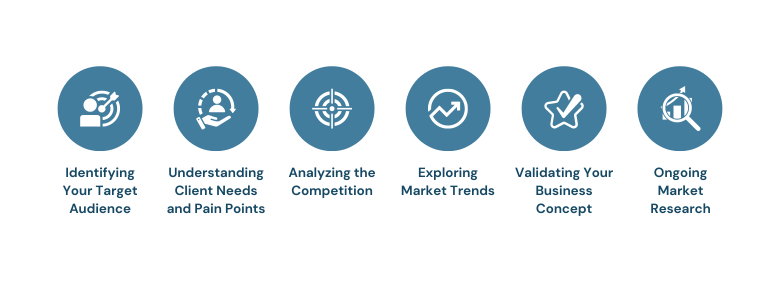Starting a coaching business can be a rewarding venture, but it also requires careful planning and attention to detail.
Many potential coaches might wonder, How can I ensure my coaching business takes off successfully in 2024?
The business plan should include your business’s name, acquiring a business license, and working with a lawyer to create a solid coaching contract.
Many coaches fail before they start.
The reason might be that they become overwhelmed or ignore the technical aspects of starting a coaching business.
Creating a coaching business plan requires precision and patience.
Here are 8 essential Steps coaches need to take off from the ground and run their coaching business.
Let’s go…

Here’s a quick overview of what you can expect to learn:
- Choosing Your Niche: Identify your expertise to attract your ideal clients.
- Conducting Market Research: Understand your audience and competitors to customize your services.
- Building a Website: Set up a digital space to showcase your services and connect with clients.
- Setting Up Financial Accounts: Organize your finances with a business bank account.
- Implementing Tools and Software: Use technology to streamline operations and client management.
- Establishing a Dependable Team: Build a support network of mentors, freelancers, or part-time staff.
- Creating a Coaching Program: Design programs that provide value and facilitate client transformation.
- Marketing Your Business: Use multiple channels to promote your unique value and attract clients.
Why Start A Coaching Business?
Everyone has a personal preference for their coaching business.
For one, coaching is a service where you bring value to others by understanding their needs and what they need.
For others, earning some extra income might be a side hustle.
You will get involved in meeting people’s needs.
Coaching offers you the opportunity to help people grow and improve- not just professionally but also personally.
We see coaching as successful in the future, so investing your time, energy, and skills in this profession is worth investing.
In short, you might have one of these three reasons:
- You want to provide value;
- You want flexibility from your 9 to 5 job;
- You want to make more money.
Benefits of Coaching Business

- Diverse Revenue Streams: Expand beyond private and group sessions with product sales and additional services.
- Low Startup Costs: Minimal initial investment is needed; start with a website and social media.
- Passion-Driven Work: Share your expertise and make a difference.
- Constant Demand: High-quality, niche expertise is always sought after.
Topic of Interest: 7 Strategies to Boost Your Coaching Business Sales
How to Start a Coaching Business in 8 Steps
1. Choose Your Niche
The first step is to identify your expertise.
Do you have any expertise to share?
If you can teach others something you have experienced, worked through, and have a degree.
Sometimes, coaches fear losing clients and, therefore, do not pick a niche.
As a result, everyone is served when you please everyone.
Focusing on one niche outweighs the risks.
Choosing a specific niche will help you stand apart from the competition and distinguish your coaching business.
If you want to reach your ideal client, identify your niche that helps to maximize your revenue.
2. Conduct Market Research
The foundation of a successful coaching business is deeply rooted in effective market research.
Understanding the market is critical, not just at the outset but as an ongoing process to adapt and thrive in a competitive landscape.
This research enables you to identify and target a specific audience whose needs align with your services, ensuring a higher likelihood of success.

Identifying Your Target Audience: Begin by segmenting the market to identify your ideal client.
Look beyond basic demographics like age, gender, and location to delve into psychographics—understanding their lifestyle, values, challenges, and aspirations.
This nuanced understanding of your audience is essential for tailoring your messaging and services to their specific needs.
Understanding Client Needs and Pain Points: Once you have a clear picture of your target audience, focus on understanding their needs and pain points deeply.
What challenges are they facing that your coaching can address?
What goals do they aspire to achieve?
Conducting surveys, interviews, and focus groups can provide invaluable insights into their minds, allowing you to refine your coaching offerings to better meet their needs.
Analyzing the Competition: A thorough market research process also involves a detailed analysis of your competitors.
Who else is offering similar coaching services?
What are their strengths and weaknesses?
Understanding your competitive landscape can help you identify gaps in the market that your coaching business can fill, allowing you to differentiate yourself and develop a unique value proposition (UVP).
Exploring Market Trends: Stay informed about the latest trends in the coaching industry and the broader market that could impact your business.
This could include new coaching methodologies, technological advancements, or shifts in consumer behavior.
Being attuned to these trends can help you anticipate changes and adapt your services accordingly, keeping your coaching business relevant and appealing to your target audience.
Validating Your Business Concept: Use the insights gathered from your market research to validate your business concept.
Does your proposed coaching service meet a real need in the market?
Is there sufficient demand to support your business?
This validation process might involve creating a minimum viable product (MVP) of your coaching program and soliciting feedback from a small group of your target audience.
Ongoing Market Research: Finally, recognize that market research is not a one-time task but an ongoing process.
Markets evolve, new competitors emerge, and consumer preferences change.
Continually gathering and analyzing market data will allow you to stay ahead of the curve, making proactive adjustments to your coaching business to ensure long-term success.
3. Build a Website to Sell your Coaching Services
Once you have done the market research and found your targeted audience, it’s time to build your website.
By designing a website, you can give visitors a clearer picture of who you are, what you offer, and why you help.
Many leads will come directly from your website, which is typically the first place people look for more information about you.
As you create a website, it’s crucial to keep in mind the following questions and design accordingly-
- Who your targeted audiences are looking for?
- What solutions do you offer?
- What are their pain points?
- What questions do they need to be answered?
While websites are essential, you don’t need to spend thousands of dollars or hire a designer to customize them.
Instead, you can easily get started with a website platform like WordPress, Wix, Squarespace, etc.
If you’re using the Kajabi platform to sell your coaching courses, check these useful tools to boost your coaching sales.
You can also use social proof to increase coaching sales.
4. Setting Financial Account
Immediately after your coaching business has been incorporated, open a business bank account.
You may consider other business structures in addition to the sole proprietorship.
Additionally, if you choose to operate in a specific state, such as Texas, opting for a local bank account for your Texas LLC will make day-to-day financial management more convenient and provide faster processing.
A business bank account is an essential step in starting a coaching business.
You can separate your personal and business funds by opening a separate business account.
Separating funds prevents you from being sued if a client sues your company.
5. Setting Up Tools and Software
The next step in your coaching business is to establish systems and processes so that you can nurture your clients.
Providing seamless client experiences starts with the right marketing tools and productive software.
If you don’t have the right tools, you might focus more on your business than your clients.
Finding ways to automate these tasks is critical for giving you more time and energy for coaching sessions.
For example, you probably got into business to coach clients rather than answer emails, schedule meetings, or send dozens of contracts and consulting invoices.
6. Establish a Dependable Team
Starting a coaching business requires several key elements.
One of the most important is finding the right coach to guide you.
It takes a long time to start a coaching business online.
The experience can certainly be exhilarating, but it can also be quite isolating.
Regardless of your hard work, you cannot run a business alone.
Whether you hire staff or not, you must build a team that can support you at every step and encourage you as you go.
There is no need for these people to be business partners or employees.
A mentor can help you with the early stages of setting up an online business.
Alternatively, they can be peers, fellow freelancers, virtual assistants, or part-time administrators.
Having people to celebrate and lean on is crucial, no matter who you turn to.
7. Create a Coaching Program
Creating a structured framework for your online coaching programs is not just a step towards efficiency; it’s a foundational aspect of delivering transformative experiences to your clients.
A well-designed coaching program can significantly differentiate your services in the market, enabling you to focus on providing high-quality coaching rather than getting bogged down by administrative tasks.
To develop a coaching program that truly resonates with your target audience, start by conducting a thorough needs assessment.
This involves understanding the specific challenges, goals, and aspirations of your potential clients.
- What obstacles are they facing?
- What outcomes do they wish to achieve?
- How do they envision success?
This deep understanding will guide the structure and content of your coaching program.
Consider the unique value proposition of your coaching services.
What can you offer that is distinct from other coaches in your niche?
This could be your proprietary methodology, personalized coaching tools, or your unique perspective based on personal experiences.
Highlighting these elements in your coaching program can make it more appealing to your ideal clients.
Design your program with flexibility in mind.
While a structured approach is essential, offering personalized pathways within your program can cater to varying client needs and learning styles.
This could involve modular content, one-on-one sessions, group coaching, or a combination of these elements.
The goal is to create an environment where clients feel supported in their journey and motivated to achieve their goals.
Incorporate measurable milestones and feedback mechanisms into your program.
Clients should be able to see tangible progress as they move through your program.
This not only boosts their confidence and motivation but also provides you with valuable insights into the effectiveness of your coaching methods.
Regular feedback sessions can help you tailor your approach to better meet the needs of your clients, ensuring a dynamic and responsive coaching experience.
Technology can be a powerful ally in delivering your coaching program.
Utilize online platforms and tools to facilitate communication, deliver content, and manage progress.
The right technology, from video conferencing tools for live sessions to learning management systems for distributing course materials, can enhance the accessibility and impact of your coaching.
Marketing your coaching program effectively is crucial.
Clearly articulate the benefits and outcomes of your program in your marketing materials.
Share success stories and testimonials from past clients to illustrate the potential transformation.
Engaging content that showcases the value of your program can attract the right clients and inspire them to embark on their coaching journey with you.
Finally, consider the scalability of your coaching program.
As your business grows, you’ll want to ensure that your program can accommodate an increasing number of clients without compromising quality.
This might involve training other coaches in your methodology or leveraging digital tools to deliver aspects of your program more efficiently.
Planning for growth will help you maintain the effectiveness of your coaching program over time.
8. Market, Market, and Market.
Your coaching business’s success hinges on your ability to market your services effectively.
The art of marketing involves accurately explaining your offering and highlighting your qualifications and experience in a way that resonates with your target audience without seeming boastful.
To truly stand out in the crowded coaching marketplace, it’s essential to adopt a multi-channel marketing approach.
This means not limiting yourself to a single platform or method but spreading your efforts across several channels to maximize reach and impact.
For instance, leveraging social media platforms like Instagram, LinkedIn, and Facebook allows you to connect with different segments of your audience where they are most active.
Tailor your message to each platform to ensure it aligns with the expectations and norms of that specific community.
Instagram can showcase more personal, behind-the-scenes content, while LinkedIn is ideal for sharing professional insights and achievements.
Email marketing is another powerful tool in your arsenal.
By building an email list of interested prospects, you can nurture these leads with regular updates, helpful tips, and exclusive offers related to your coaching services.
An effectively managed email campaign keeps your audience engaged and increases their likelihood of turning to you for coaching services.
Additionally, consider leveraging content marketing by creating valuable resources such as blogs, ebooks, or webinars that address the common challenges or goals of your target audience.
This not only helps in establishing your authority and expertise in your niche but also improves your search engine visibility, drawing more organic traffic to your website.
Networking events and speaking engagements are also critical components of a successful marketing strategy.
These opportunities allow you to showcase your knowledge and connect with potential clients in a more personal and impactful way.
Whether it’s a local business meetup or an industry conference, each event is a chance to expand your network and introduce your coaching services to a broader audience.
Remember, effective marketing is not about selling aggressively but about building relationships and trust with your potential clients.
By consistently providing value and demonstrating your expertise, you’ll attract and retain clients more effectively.
Finally, don’t underestimate the power of testimonials and word-of-mouth referrals.
Satisfied clients are your best ambassadors.
Encourage them to share their experiences with your coaching services through testimonials on your website or social media.
A personal recommendation from a happy client can be incredibly persuasive to potential clients.
Final Words
You can get motivated by thousands of stories from other coaches who have started their coaching business successfully.
But remember, it takes time to establish your coaching business.
Every business starts by taking small steps, making it grow with your efforts, and continuing to learn along the way.

